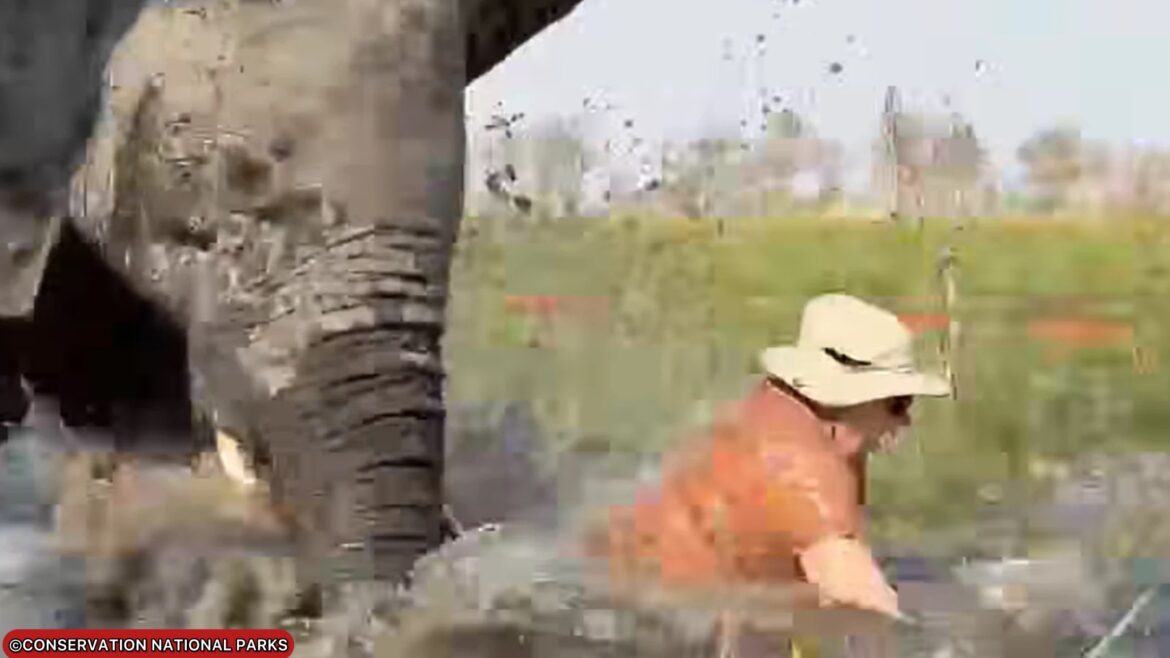Protective beast charges group after traditional boats venture too close to calves in Botswana’s Okavango Delta
British and American tourists narrowly escaped death when a six-tonne bull elephant capsized their traditional canoes and trampled them in crocodile-infested waters during a wildlife safari in Botswana’s Okavango Delta.
The terrifying incident unfolded on Saturday when the protective bull charged at the group after their wooden boats, known as mokoros, ventured too close to a female elephant with her two calves.
Dramatic footage captured the moment the massive animal stormed through the shallow, reed-filled waters, using its trunk and tusks to overturn two canoes despite desperate attempts by guides to retreat. The attack sent four tourists plunging into waters known to harbour crocodiles and hippopotamuses.
In a particularly harrowing moment, the enraged elephant pinned one British woman underwater with its trunk for nearly ten seconds, with witnesses fearing she would drown before the animal eventually released her and retreated with the herd.
Lucky Escape from Death
A former South African game ranger, analysing the footage, told the Daily Mail the tourists had “a very lucky escape indeed” as all four could easily have been killed by the angry bull.
“The woman was lucky not to have been gored, but if it had held her down for another few seconds, it would probably have drowned her. So she can praise the Lord he didn’t,” the ranger said.
The incident occurred in the UNESCO World Heritage Site, which was registered in 2014 and is renowned for its extraordinary biodiversity. The delta supports approximately 130,000 elephants, roughly one-third of Africa’s total population.
A receptionist from a local tour company, speaking to the Daily Mail, confirmed British and American tourists made up the group on the tour. “There was a lot of expensive camera equipment and phones lost or damaged, but it is a blessing nobody was badly hurt. Wild animals can be very unpredictable,” she said.
Traditional Boats Popular Despite Risks
Mokoros, traditionally carved from tree trunks but now often made from fibreglass, are flat-bottomed vessels steered gondola-style by skilled polers through the delta’s shallow channels. These silent, environmentally-friendly boats have become synonymous with the Okavango experience, particularly popular among wildlife photographers and birdwatchers seeking intimate encounters with nature.
Thousands of these traditional canoes operate throughout the delta, taking tourists through reeds to view elephants, hippos, birds and crocodiles. However, Saturday’s incident has highlighted the inherent dangers of such close wildlife encounters.
The attack appears to have occurred near a village where foreign tourists often hire local guides rather than in a protected wildlife area with stricter safety protocols. Video footage shows the guides attempting to pole away rapidly as the elephant charged, but the animal’s speed overwhelmed their efforts.
Guides’ Fatal Misjudgement
The former game ranger suggested the guides had made “a potentially fatal mistake” by misjudging how close they could safely take tourists to the elephant herd.
“This bull attacked because it was protecting its young, and it seems the guides misjudged how close they could take the tourists safely,” he explained.
Footage appears to show the two guides abandoning the capsized tourists and fleeing to the riverbank whilst the visitors struggled in the water. The tourists later described the experience as “frightening but unforgettable” despite the terror of the moment.
The Okavango Delta holds special significance for the British Royal Family, being a favourite destination of Prince Harry. He took both his former girlfriend Chelsy Davy and later his wife Meghan Markle on romantic getaways to the region, cementing its reputation as one of Africa’s premier wildlife destinations.
Growing Pattern of Attacks
This latest incident follows a disturbing pattern of elephant attacks on tourists across southern Africa. Earlier this year, another motorboat carrying British tourists was struck by an elephant in similar circumstances.
More tragically, in July, two female tourists – one British and one from New Zealand – were killed in Zambia when a protective female elephant charged whilst they were on a walking safari. The victims, identified as Easton Taylor, 68, from the UK and Alison Taylor, 67, from New Zealand, were attacked by a female elephant protecting her calf.
African elephants, which can weigh up to seven tonnes and reach speeds of 25 mph, are responsible for approximately 500 human deaths annually. Male bulls can grow up to 13 feet tall at the shoulder and are known for their fierce protective instincts when defending their herds.
Conservation Success Creates Challenges
Botswana’s elephant population represents both a conservation triumph and a growing challenge. Home to roughly one-sixth of the planet’s elephants, the country has seen numbers recover significantly from historical lows. In areas like Chobe, herds gather in some of the highest densities recorded anywhere in the world, particularly during the dry season.
Within the Okavango, elephants are most commonly spotted along seasonal fringes and in the Moremi Game Reserve, though smaller bachelor herds remain resident year-round in swampy areas. These bachelor groups typically join larger, female-led herds only during mating opportunities.
As Africa Safari Magazine notes: “Elephants in the Okavango don’t merely exist – they dominate the landscape. The deeper you explore these wetlands, the more their ancient power reveals itself.”
Wildlife experts stress that whilst such attacks remain relatively rare given the thousands of successful safari experiences daily, they underscore the importance of maintaining respectful distances from wild animals and adhering to strict safety protocols.
The incident serves as a stark reminder that despite their majestic appearance and the controlled environment of organised tours, African elephants remain wild, unpredictable animals capable of devastating violence when they perceive threats to their young.
For the British and American tourists who survived Saturday’s ordeal, their close encounter with one of nature’s most powerful land mammals will undoubtedly remain etched in memory – a terrifying testament to the raw, untamed reality of Africa’s wilderness.
Follow for more updates on Britannia Daily



